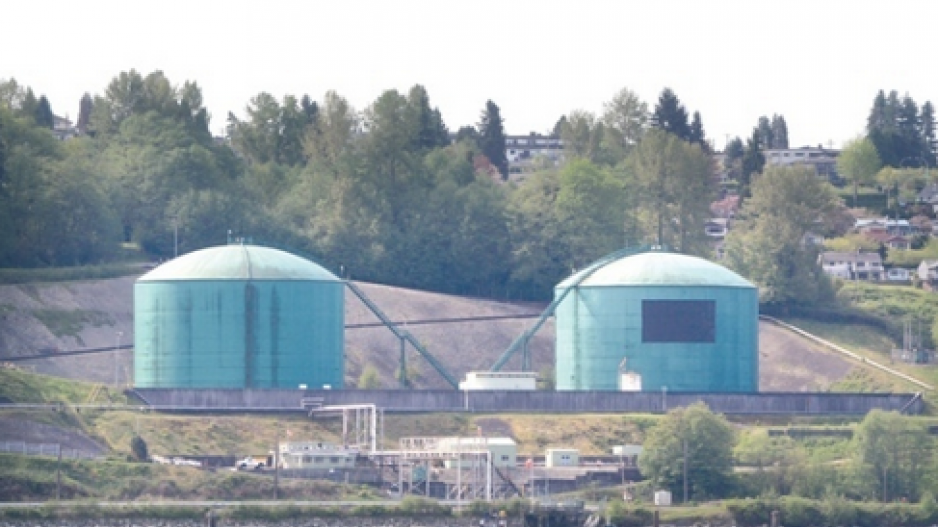Anti-pipeline groups including members of the Tsleil-Waututh Nation and other opponents of the Kinder Morgan expansion are applauding the province’s announcement that it does not support the plan at this time.
The B.C. government made its position public January 11 in written submissions to the National Energy Board, arguing Trans Mountain has so far not provided enough evidence that it is capable of preventing or cleaning up a major oil spill.
A world-class oil spill response plan is one of five conditions the province said it would require to support Kinder Morgan’s pipeline expansion plan.
Rueben George, spokesman for the Tsleil-Waututh’s Sacred Trust Initiative, said the province’s concern about inadequate spill response is shared by the First Nation, which has long opposed the Kinder Morgan pipeline plan.
“We knew all along it wasn’t a good idea,” said George.
George said the cleanup response by local authorities to the relatively small oil spill from the Marathassa in April just cemented that opinion.
“In that little spill in English Bay, it took them 12 hours to notify people,” he said. “It’s very inadequate.”
George said most of the oil from spills can’t be cleaned up anyway. “The best cleanup possible is 20%,” he said.
In a press conference call January 11, B.C.’s Environment Minister Mary Polak said the province hasn’t seen evidence the pipeline company is meeting high enough environmental standards.
“The onus is on the company to prove they can meet those conditions,” she said.
Current oil spill response isn’t adequate, even for existing shipping, she added.
“We need improvement.”
The local anti-pipeline group North Shore NOPE also applauded the province’s rejection of the pipeline expansion.
“It’s not safe. We know that. They have not done an adequate risk assessment,” said Janice Edmonds, spokeswoman for the group. “They’ve never done a risk analysis east of the Second Narrows Bridge.”
Edmonds called the National Energy Board process “extremely biased and flawed,” adding her group and others opposed to the pipeline are disappointed the new Liberal government hasn’t halted the Kinder Morgan review.
In December, Natural Resources Minister Jim Carr said in parliament that projects already in a review process will not have to go back to “square one” – but said there will be a transition period “that will embody the principles that were in the campaign platform.”
Edmonds says that is not good enough.
“They should change it right now,” she said. “(Justin) Trudeau promised he wouldn’t go ahead with any project that didn’t have social licence. He told us he would not go forward with that.”
Terry Beech, Liberal MP for Burnaby North-Seymour, said he knows the Kinder Morgan issue is “high up on various ministers’ radars.”
“In terms of the B.C. government’s opposition, community support is one of the things we talked about in the election. If the province isn’t supporting it, that adds to the community concerns.”
Beech is planning to leave his first parliamentary session in Ottawa early to attend the hearings with Calvin Taplay, one of the intervenors who’s scheduled to present on January 29.
North Shore municipalities, First Nations and environmental groups opposing the pipeline are all scheduled to make oral submissions to the National Energy Board on the pipeline project later this month, starting on January 22 with the Squamish Nation and continuing to January 27 when North Shore NOPE will present. At the same time, the Tsleil-Waututh will be in federal court January 22 to ask that the court stop the NEB’s review of the project, which they argue began with inadequate consultation with First Nations.
In its written submissions, the province pointed to problems with spill prevention and response both on land and in the water.
Among the land-based problems, Trans Mountain has refused to agree to put isolation valves on the pipeline that would limit the maximum possible volume of oil that could escape in a spill to 2,000 cubic metres, according to the province. It also does not have an adequately proven leak detection system, the province stated, adding half of land-based spills in the past decade have been first reported by third parties.
The province also voiced concern over Trans Mountain’s record of refusing to take action to prevent damage until a spill has been confirmed.
The province also expressed worry that the contracted oil spill cleanup company has no large workforce available in the event of a major spill. There is also no skimming or containment vessel available to deal with an offshore oil spill, the province stated.
Kinder Morgan wants to twin the Trans Mountain pipeline, which is currently the only line that runs oil from Alberta to the West Coast. The expansion would increase capacity from 300,000 barrels per day to 890,000 and see an increase in tanker traffic from five tankers a month to 34.
Kinder Morgan has released a statement saying it’s confident the company can satisfy the province’s conditions by the end of the hearing.
A final decision from the National Energy Board is expected to go to the federal cabinet in May.
– with files from Jennifer Moreau/Burnaby Now




